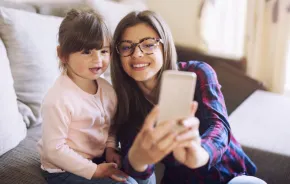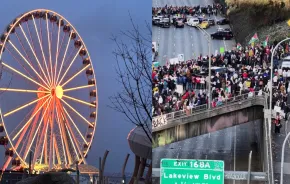
Editor's note: This article was sponsored by the Bill & Melinda Gates Foundation.
Writer and activist Bitaniya Giday is a first-generation Ethiopian American who was named Youth Poet Laureate by Seattle Arts & Lectures in June. Alongside her schoolwork as an incoming senior at Bellevue’s Newport High School, that means Giday will also spend the year ahead performing and speaking, as well as writing a book of poems that will be published by Poetry Northwest.
As a youth ambassador with the Bill & Melinda Gates Foundation Discovery Center and as cofounder of Eastside 4 Black Lives (@eastside4blacklives), a grassroots organization of BIPOC youths working to bring accountability and equitable action to the Eastside, Giday has already gained much experience in organizing impactful community action and initiatives. We caught up with her to learn more about how her poetry informs her unique brand of artistic activism and where she sees her storytelling mission leading her next.
When did you start writing poetry?
In eighth grade, I was ASB [Associated Student Body] president, and the annual MLK Summit was coming around the corner — it fell into our hands to plan and curate that event. I had discovered slam poetry videos on Button Poetry, and I said, “You know what, let’s write poems that will amplify our voices.” So, we ended up doing that, and the poem I wrote was well-received. I felt like I was reclaiming my voice, reclaiming my identity. It was such an empowering experience, and it led me to find a home at Youth Speaks Seattle, a space where I knew I could always feel like that, where I could be supported.
What people or experiences have helped you develop as an artist?
I think first of all of my mom, who cultivated my love for reading books and creating. After we immigrated from Ethiopia, we had no family here — we were really alone. I was not speaking English, I didn’t have friends, so I would read books about childhood friends. That’s how I developed my love for escaping, for reading books to transform the space and the circumstances that I’m in.
But in terms of the poetry path, in eighth grade, my English teacher encouraged my love for writing. He was the one who helped edit the TED Talk that I did when I was a sophomore in high school. He really pushed my writing along.
In terms of poets, I would say some local ones are Ebo Barton, an amazing trans writer who talks a lot about their identity in a beautiful way that has always inspired me to look beyond just describing things. Another one is William Nuʻutupu Giles — an incredible poet who is recognized at the national level and has always been a mentor to me. He edits my poems and gives me feedback on them.
But there are a lot of different people throughout my life who have helped me understand how poetry can be used in different spaces and for different efforts — how it can be a part of the healing process and how that is a form of activism, of resistance.
What themes do you like to explore through your poetry?
I always reference the word home, because I feel like when you are part of the diaspora, you’re always searching for a place where you’re accepted. When you are first-generation, you kind of lose your connection to your homeland because you’ve just not grown up in the same cultural world that your parents did. If I can make someone feel at home, if I can make someone feel connected to someone or something, just for that four minutes of reading a poem — that is what I strive for.
In general, my poetry references womanhood, blackness and identity. Women in my family have always been the storytellers, the ones who passed down history that’s not in our textbooks. I kind of do that through poetry, too, where it’s a space of storytelling and recollection of history that isn’t recorded elsewhere.
Do you have a vision for the book that will be the culmination of this year as Seattle Youth Poet Laureate?
I was writing a poem just a couple of weeks ago around the idea of broken English, so I developed this idea of a title called “Before They Broke Us.” [It would be] kind of a culmination of the story of diaspora, a coming-of-age story of a first-gen American woman navigating the world.
How would you advise other young people to be a changemaker?
I don’t think it is necessarily about being a changemaker — it’s about finding something that is important to your life, important to your family, and just doing something about it. It’s that break from silence, that break from fear of what people might say or think if you decide to stand up.
Decide each day that you won’t be silent, that you want to further this work. Focus on the individuals — whether it’s your siblings, whether it’s your friends, whether it’s your teachers — and make the effort to make the world a better place for them. Eventually you will make the world a better place in general.
How would you advise a parent to support their child in this process?
It’s very hard to find programs that can be really impactful to your child’s life, if you’re not actively doing the research to find what opportunities are available, whether they’re free or not. Parents need to guide their kid to enter those spaces, apply for them — and then hold their kid accountable. Because I think sometimes parents give opportunity to their children, but they don’t guide them or hold them accountable to following through. Sometimes kids unknowingly will drop the ball on things.
Do you see writing and poetry as your eventual professional path in life?
I want to double-major in philosophy and political science, and then go to law school. But I also see poetry and storytelling as an effective way to get a message across, especially if you’re working on important issues. There needs to be a way to bring people together. I think poetry is that for me — kind of my secret weapon, if that makes sense.
How have you been coping with all the disruption of the pandemic?
I thought that I was going to be super isolated. But honestly, we haven’t had this many community events and people coming together in years! It’s every single day. I’ve never felt so loved — or so much healing and joy — ever in my life.












